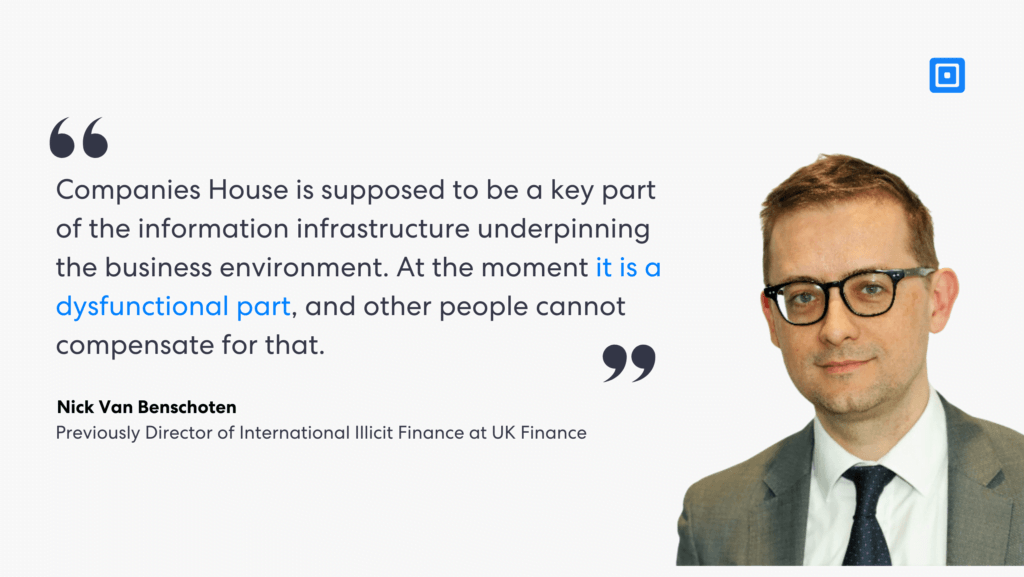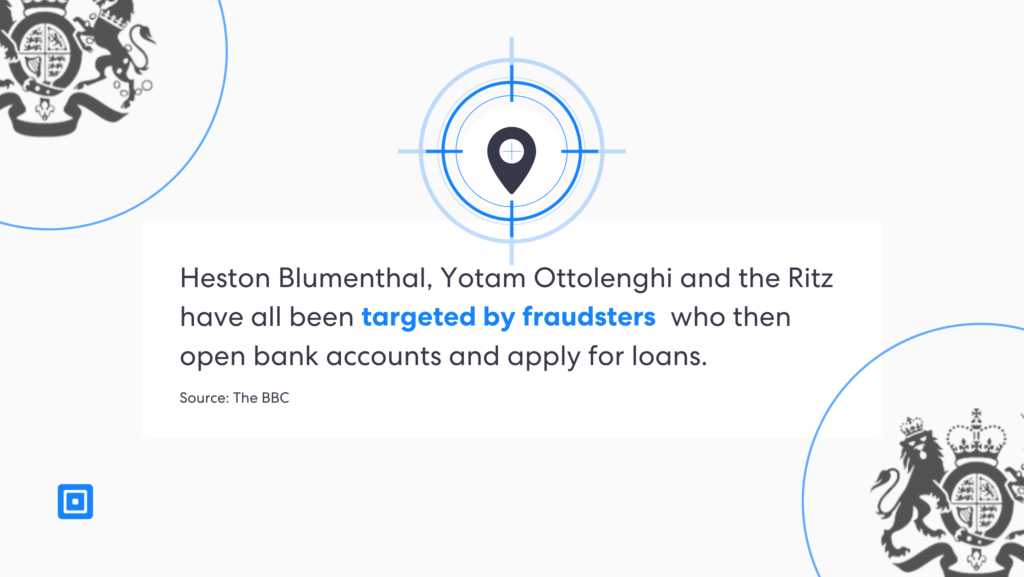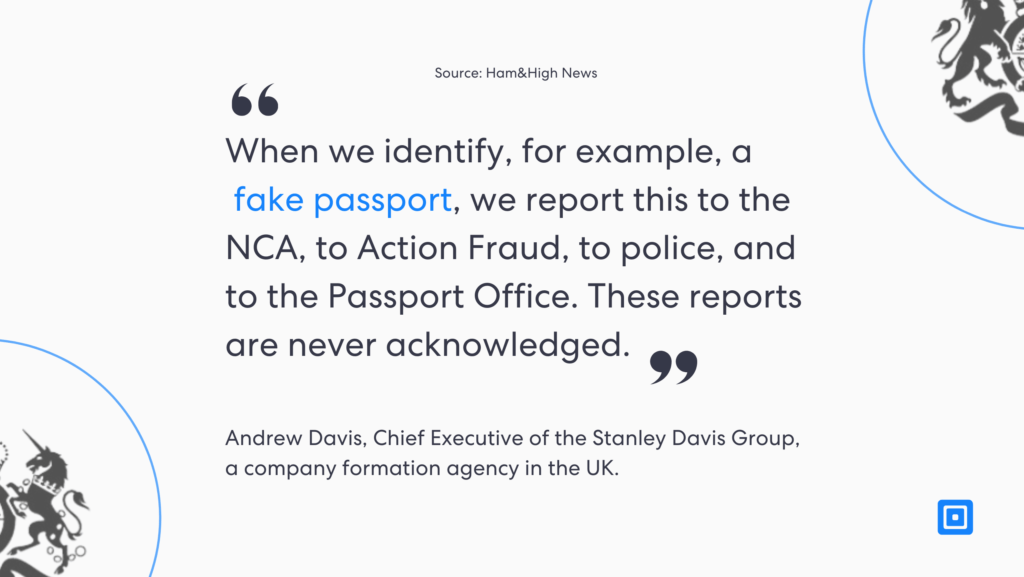The UK is often considered an optimal place to start a business. London is a global financial hub, the country’s workforce is highly skilled, and the legal system is stable and transparent, protecting intellectual property rights and enforcing contracts. Perhaps most importantly, starting a business in the UK is easy and straightforward. There are numerous online resources and government initiatives to support new businesses, as well as a relatively straightforward taxation framework in which HRMC offers support and guidance. But… is it too easy to set up a business? Some might argue so, as several news pieces and reports point to Companies House, the executive agency of the British Government that maintains the register of British companies, having become home to a form of business identity theft. A lack of comprehensive identity verification seems to be the culprit.
Fraudsters register fake companies, steal the identity of other businesses by “cloning” them, and then ask for loans. This might seem like a new form of fraud, with a BBC News article reporting on what is now being referred to as company cloning scams just earlier this year. But if we dig a little deeper, we find fraud reports from 2022, 2020, and 2019, with no real action having been taken.
However, can we really only blame the UK government? Not all businesses are set up directly through Companies House, which begs the question – who are the key enablers of these fraudulent practices? While the UK is a great place for budding entrepreneurs, it seems like it’s also a great place for fraudsters. Before we name the primary cause of these scams, let’s examine how they have unfolded over the past few years.
A Familiar Scam? It Seems So…
BBC News reported a case early this year that certainly isn’t the first of its kind, a cloning scam in which some of the UK’s leading restaurants have been cloned as part of an emerging business identity theft fraud spike.

Over 750 fake firms were reported to have been registered, often with misspelled names, within just a six-week period. Companies House then began an investigation, though perhaps this should have been carried out in 2022 after some very similar news articles hit leading publications. The Guardian’s articles “Fakers, fast sign-ups and fraud: the crisis at the UK’s Companies House” and “Companies House is dysfunctional and facilitating fraud, MPs told” had reported these very same crimes back then. The latter piece stated as a subheading that less verification is needed “for someone to set up a fraudulent shell firm than to borrow a library book.”
It’s easier for someone to set up a fraudulent shell firm than to borrow a library book.
Graham Barrow, a money-laundering expert who leads The Dark Money Files podcast, outlined the problem to the Guardian in 2022, highlighting that burner companies are created for short-term fraudulent activity, and these companies then suddenly disappear. He went on to state in the piece, “You have to provide verification of your identity to borrow a library book; you don’t have to do that to create a company which could cause tens of thousands of pounds’ worth of damage to our economy.”

Banks were quick to support Benschoten’s concern, with fraud directors at HSBC and NatWest publically echoing his worry over the lack of checks conducted through Companies House.
Interestingly enough, a director from Companies House responded to some of these claims in the Guardian’s article, arguing that within three or four years, they planned to turn things around. He stated, “We want to be a preventer of fraud.” Considering that this piece came out in 2022, and the BBC has followed up with similar concerns being voiced in a 2024 article, we’re faced with a pressing question: why has Companies House not implemented identity verification processes in the past two years? Are there any changes on the horizon?
Meet The Latest Victims
Some of the UK’s most up-market restaurants have now been targeted by company cloning scams. The latest victims included the restaurants belonging to Heston Blumenthal and Yotam Ottolenghi, two British celebrity chefs, as well as the Ritz.

Fraudsters were able to set up these fake companies within 24 hours, after which the next item on their agenda was stealing overdraft money from bank accounts set up in the name of the fake company they cloned and ordering expensive capital from suppliers and bank loans. Goods were then delivered, and invoices were left unpaid.
FCA 2021 Warning Ignored?
In January 2021, the FCA issued a warning over “clone firm investment scams,” which increased by 29% in April 2020 compared to March. The COVID lockdown led to increased investment scams as the economic climate meant more investors were looking to deploy capital to improve their financial situation. Fraudsters capitalized on this by cloning successful businesses and receiving investments through business identity theft, scamming investors into substantial losses.
Three-quarters (75%) of investors said they felt confident they could spot a scam. However, 77% admitted they did not know or were unsure what a ‘clone investment firm’ was.
The FCA’s press release on clone firm investment scams states that “Three quarters (75%) of investors said they felt confident they could spot a scam. However, 77% admitted they did not know or were unsure what a ‘clone investment firm’ was.” The amount of information failure on these kinds of scams is astonishing, considering that they’ve now been carried out for several years. With all UK businesses at risk, something must be done to change the status quo and protect both businesses and investors. Yet, it seems that even the media’s name-and-shame approach has failed to stimulate enough progress over the past few years.
So…Who’s To Blame?
There’s a common saying about blame that says, “Success has a thousand fathers, but failure is an orphan.” Should the UK government take sole accountability for a crime that many may have enabled? In reality, this chaos certainly has several enablers, who perhaps have left this failure an orphan due to a lack of individual accountability.
Not all businesses register through Companies House, as entrepreneurs often rely on company formation agencies. While company formation agencies might not have been named in these high-profile name-and-shame pieces carried out by the BBC and the Guardian, are they lurking in the shadows of these crimes?
Interestingly enough, a piece did attempt to point toward company formation agencies back in 2019. It quoted the chief executive of the Stanley Davis Group, Andrew Davis. Stanley Davis Group is a company formation agency that has been up and running since 1970. The piece echoed Davis’ views on company formation and accountability for fraud, stating, “We have neither a legal nor moral responsibility for the activities of the companies that we form.” Shockingly, he went on to say, “When we identify, for example, a fake passport, we report this to the NCA, to Action Fraud, to police, and to the Passport Office. These reports are never acknowledged.”

This certainly throws a spanner in the works for us as readers, as it becomes a matter of “he said, she said” pretty quickly. Was the NCA, police, passport office, and Action Fraud negligent in 2019? If so, is this still the case? Do we have sufficient license to even believe this quote? Perhaps it is too difficult to blame anyone for the rise of these practices, as evidence points to a cycle of mutual enablement. So, we might have to base our judgment on who is leading the reformation of this broken system rather than who caused these problems in the first place.
Challenging the Status Quo
Although the tightening of company formation processes seems to have stagnated over the past few years, it seems some movement is on the horizon. An article by solicitor Samantha Bowley outlines that the Economic Crime and Corporate Transparency Act 2023 (ECCTA) amended the Companies Act of 2006 last year. However, these changes have yet to be implemented as secondary legislation is needed. Bowler goes on to say that “The identity verification requirements are intended to improve the reliability of the information on the register at Companies House, as well as to make it challenging for individuals to create a fictitious identity, or fraudulently use another person’s identity, to set up or run a company. Companies House has indicated an intention for these measures to come into force from early 2025.”

While this is certainly well-received news, there are a few words that a hard to look past in this quote… “indicated an intention.” Companies House having indicated an intention for this to be up and running next year is certainly not a promise, and until measures are actively in place, the battle against company cloning has not yet started.
Bowley highlights the new verification routes that will form the new process at Companies House, “There will be two routes to identity verification, with individuals having the option to verify their identity directly through Companies House or indirectly through an authorized corporate service provider (ACSP), such as an accountant, legal adviser, or company formation agent. Companies House is currently in the process of developing an effective identity verification system, which will be active when the identity verification requirements come into effect.“
It seems as though a solution could be on the horizon, and hopefully, we can trust these forecasts. While not a lot of good has come out of this situation, what can we learn from it?
The Importance of KYB and Identity Verification
The importance of KYB checks cannot be underestimated. While the UK government may not have wanted to deter entrepreneurs from starting their own ventures by imposing more bureaucracy and checks, the losses to these scams are certainly not insubstantial for the UK economy. Furthermore, an environment has been created in which all entrepreneurs are at risk, which is surely a deterrent in itself to creating an entrepreneurial economy. KYB and identity verification checks must be put in place when needed, as the returns they offer on money and time invested are insurmountable, and this should never be overlooked.
Hopefully, these changes will kick in in early 2025. If all the organizations involved don’t prioritize this, we will surely find ourselves reading another BBC News piece, quoting yet another broken business ruined by another scam. Either way, you’ll hear it from us.
For more information on KYB checks, reach out to our expert compliance team or read our latest piece on UBOs.




